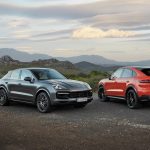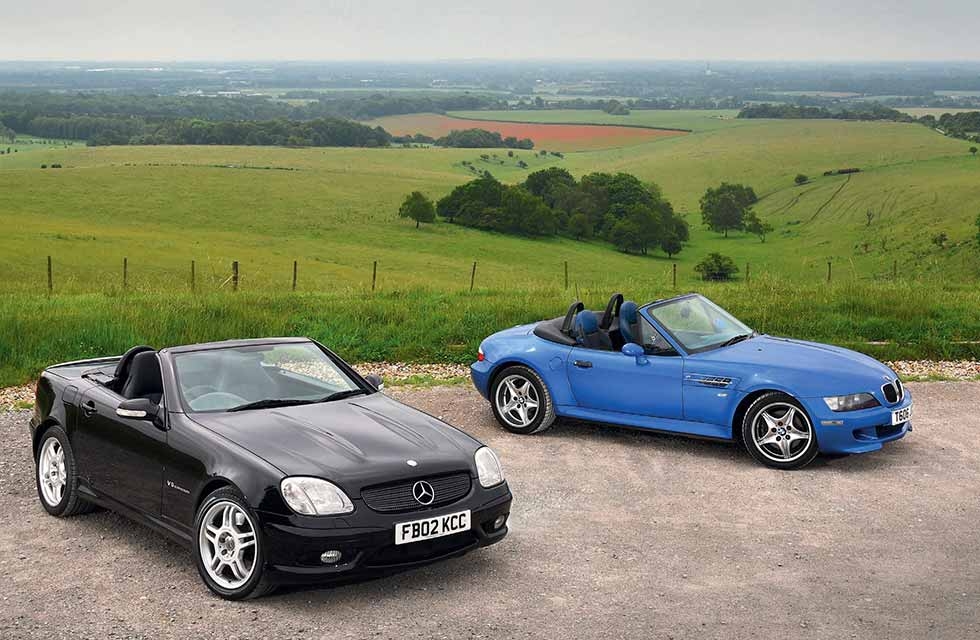
Natural brawn thrillers. This German duo used classic sports car ingredients, but did Mercedes or BMW-have the recipe for success? Words Chris Chilton. Photography Will Williams.
MERCEDES SLK32 R170 vs BMW Z3M E36/7
Move over TVR: a pair of musclebound roadsters from Germany compared
SLK AMG v s Z3M: WILD ROADSTER SHOOTOUT
The success of the original Mazda MX-5 – conceived in America, based on a British theme and built in Japan – didn’t go unnoticed in Germany. By the middle of the 1990s, both BMW and Mercedes-Benz had added compact two-seater sports cars to their line-ups. But neither the Z3, from BMW, nor Mercedes’ SLK delivered the same kind of tactile feedback as the Mazda, nor compensated with the kind of power and performance their premium badges suggested.
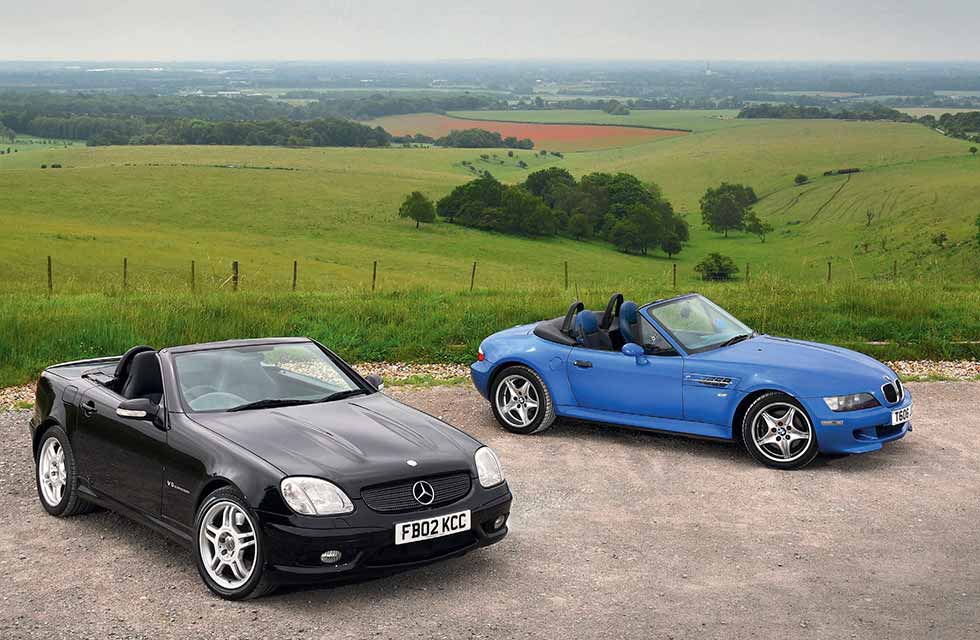
Sales were strong, but their image among enthusiasts wasn’t. When Pierce Brosnan’s 007 was shown driving a Z3 E36/7 in 1995’s Goldeneye, it was at the wheel of a feeble 140bhp 1.9-litre, the only engine available. Its opposite number at Stuttgart had a supercharger strapped to its ‘four’, but saddled with an automatic ’box and dull recirculating- ball steering it was hardly more sporting to drive. Six-cylinder variants of both followed, true, but so did the hairdresser jibes…
Enter AMG and BMW’s M Division. Household names today, but back in the late 1990s they were still fairly niche players building bespoke high-performance versions of mainstream saloons. AMG had been modifying Benzes since 1967, and doing it with Mercedes’ co-operation from ’1992. But the Affalterbach firm only became a full member of the Stuttgart family in 1999. ‘M’ cars, meanwhile, were probably more recognised on UK roads, but hardly numerous.
Upuntil 1995, BMW Motorsport was still hand-building M5s at Garching. Both badges, though, were about to join the sports car mainstream, turning the meek SLK and Z3 into demonic drop-tops that would win over enthusiasts and act as halo cars for the rest of their ranges. Expensive when new, they’re now affordable – you could pick up an example of either for less than £15k – and interest is picking up.
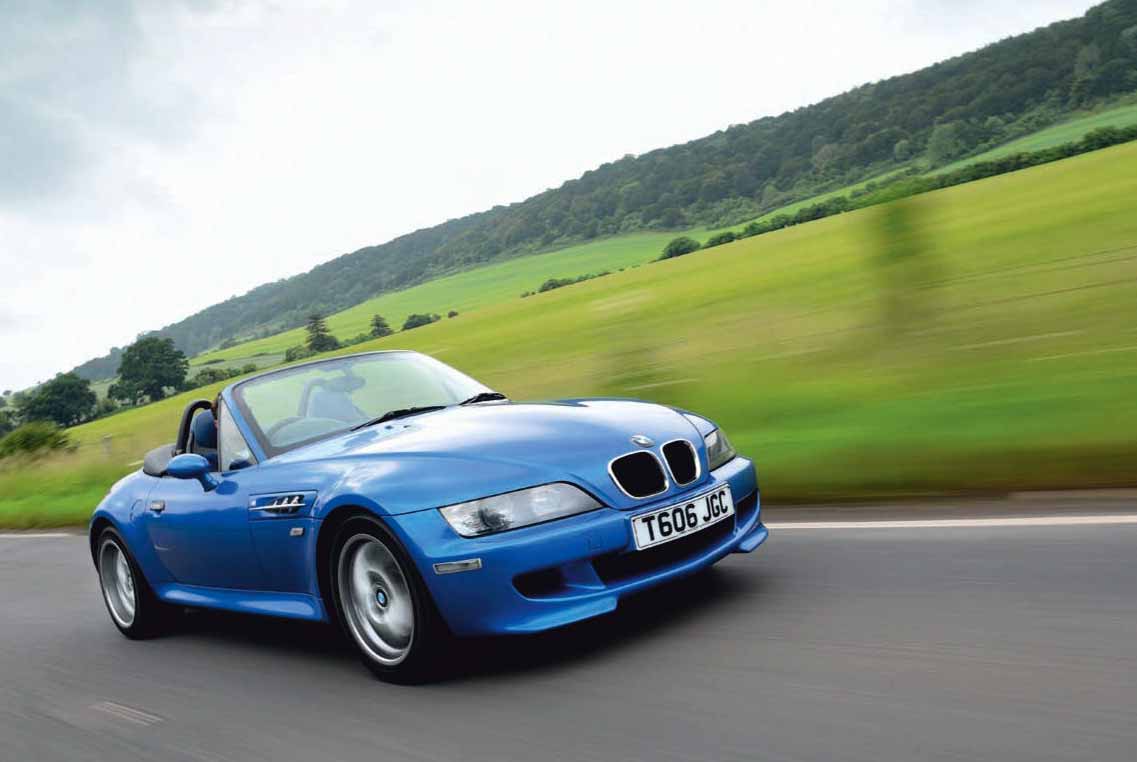
But before we get on with this Y2K ripped roadster shootout, let’s deal with the Arctic Silver elephant that’s very definitely in the room, and not in this test. We’re talking about the Boxster, the game-changing sports car that helped pull Porsche back from the brink of financial collapse. And, as if we didn’t need a further reminder, when we pick up the SLK from the Havant-based Performance Car Company there’s a pristine 3.2 S in the showroom, with fewer miles on the clock than the Benz and up for considerably less cash.
The Boxster should be the default choice today, as it was in magazine tests 20 years ago. But let’s suppose you don’t fancy the Porsche, and there are reasons you might not. There’s the internet-exaggerated fear that the engine will grenade itself, a fondness for the more traditional feel of a front-engined, rear-drive sports car, and the fact that the Boxster – even the S – just isn’t that quick. Six seconds to 60mph? An impressive feat, ordinarily, but rendered ordinary by today’s pair. Autocar timed both the M-Roadster and the SLK32 R170 in the fours in a 2001 twin test, the Mercedes taking 4.9 secs to reach 60mph, the BMW arriving a tenth sooner.
The M Roadster, built in the USA like all Z3s, was also the first to arrive in showrooms, appearing three years before the Mercedes in 1998. The styling is classic cab-backwards roadster, the long bonnet/short rear deck combination and those huge M-specific blistered back arches emphasising the front-engined, rear-wheel-drive layout. The tapering bonnet tips a hat to the 327 and 328 roadsters of the 1930s, while the pinched waist, with its low door and the stylised vent on the front wings, makes a conscious nod to the 1950s 507.
The only thing retro about the Benz, meanwhile, is the name: Sport Leicht Kurz (or Sport Light Short), which riffs on both the SL that sat above the SLK in Mercedes’ model line-up and the legendary short-wheelbase, supercharged SSK built between 1928 and ’1932.
Even today, a full quarter of a century after Mercedes previewed the production car with 1994’s SLK Concept, it looks fresh and modern. Not sensual or overtly muscular, but elegant and clean, roof up or down, its folding hardtop party piece disappearing beneath the bootlid (at the expense of most of the luggage space) without requiring the driver to do more than toggle a small switch on the console.
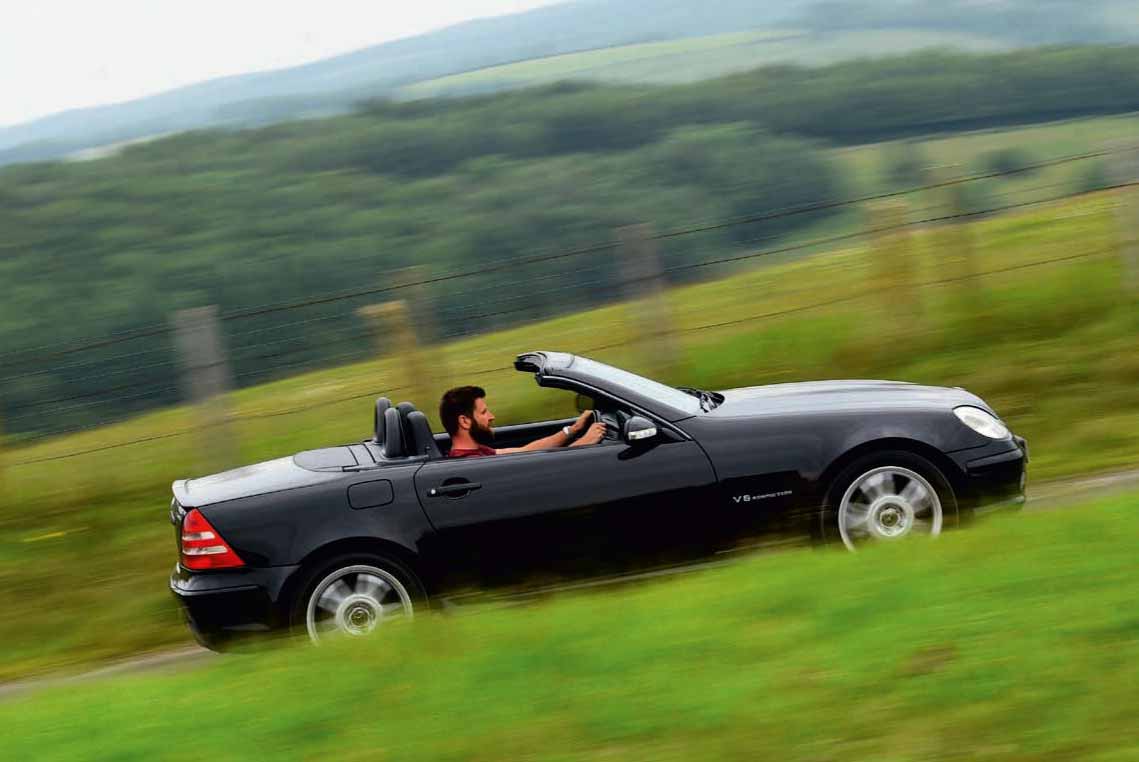
And unlike its M opposite number, with its cartoon arches and quad exhausts, the AMG’s telltales are limited to a single pair of tailpipes, a discreet ‘V6 Kompressor’ badge on each wing and a handsome set of 10-spoke wheels.
The SLK’s façade doesn’t give much clue to how much performance the 32 offers, but it does give a fairly clear indication of how it is delivered. The engine is essentially the same 3.2-litre, 18-valve M112 engine fitted to Mercedes’ contemporary E-Class, driving the rear wheels through a conventional five-speed automatic of the Stuttgart firm’s own design. But the addition of a twin-screw supercharger and intercooler lifts power from around 220bhp to almost 350, and adds a thumping 100lb ft of torque for a lumbar-pummelling 332lb ft.
The power delivery isn’t quite as off-idle instant as in the bigger V8 Kompressor engines being fitted to E-, S- and SL-Class cars at the start of the new millennium, but it feels urgent everywhere. The noise, deep and muscular, with a mixture of exhaust growl and supercharger whine, sounds purposeful and never becomes intrusive. But it’s also slightly one-dimensional, sounding much the same when the meat of the power comes in at 3500rpm as it does at the unambitious redline 2500rpm later.
But the real beauty in the SLK is how easy that performance is to access. Mercedes’ Speedshift transmission allows manual changes by tipping the lever left and right from the ‘D’ position, but in practice you find yourself relying on the ’box’s automatic mapping to do the legwork. As for the driver, the only leg that needs a workout is the right one: just push and go. And the SLK32 really does go, to 100mph in 11.2 secs and on to an artificially limited top speed of 155mph.
The M Roadster matches it every step of the way, but asks for plenty of help from the driver to achieve it. The mandatory manual transmission has a typically BMW longish throw, and the interplay between the throttle and the weighty clutch means even changing smoothly between first and second demands spoon-bending levels of concentration for the first few goes.
But the Z3 M is the kind of car that makes you want to persevere and put the effort in. With no artificial breathing apparatus to fall back on, the BMW’s M3 Evolution-derived S50B32 engine can’t make as much power as the Benz, though its incredible 317bhp from 3.2 litres is by far the more impressive achievement. The magic 100bhp per litre was no longer the preserve of racing cars with the kind of manners that would make Stig of the Dump look like a graduate of a Swiss finishing school.
Still, there’s no getting away from the colossal 74lb ft shortfall in torque. Stab the accelerator at the same 3500rpm that would have the Benz leaping forward and, while the throttle response is instant, the M doesn’t seem to have the same ability to emboss the seatback with your spine print. But keep your foot in and the power builds and builds, and the Mkeeps on pulling, well past the 6000rpm point where the SLK has thrown in the towel and resorted to another ratio, and all the way up to 7600rpm, its engine note shifting ever so slightly with each spin of the crank until it’s screaming its lungs out.
From 1999, theMRoadster switched to the newer S54 engine that had appeared in the then new E46 M3. The impact for UK buyers was low, just a couple of horsepower gained and a more sophisticated traction control system thanks to the newer motor’s electronic throttle. But in the USA, where the E36 M3 and M Roadster had sacrificed their individual throttle bodies for a single one in the name of emissions, the significance was huge, with the M Roadster gaining more than 70bhp in the switch.
But both S50 and S54 engines were stuck with a five-speed manual gearbox, lacking the floorpan space to take the six-speed that backed the same engine in the M3. And while much of the componentry came from BMW’s contemporary – and critically acclaimed – E36 3-Series, the Z3 didn’t get that car’s multi-link ‘Z’ axle, making do instead with the semi-trailing-arm set-up from the 3-Series Compact and older BMWs. If having that at one end, and something that is not a million miles away from half a McLaren F1 engine at the other, sounds like a recipe for the kind of oversteer even the Hoonigan himself Ken Block would struggle to contain, the reality is quite different. Unless you’re ham-footed the M is predominantly an understeerer, and even then only when pushed, meaning that you can drive it hard in safety. At least in the dry.
No, the M Roadster’s dynamic disappointments happen at the other end of the chassis. Like most BMWs of the time it could do with more on-centre steering feel and, just like the classic 1960s roadsters it apes, a whole lot more structural stiffening. The SLK32’s body feels far more rigid, and the driving experience vastly more modern as a result. It feels much less like a low-volume hot rod and more of the polished factory-built performance car it is.
But you don’t feel much of anything in the SLK32, whether you’re ambling through town or stroking it along at a lick. In contrast to the BMW’s TR-style, elbow-on-the-door driving position, the AMG has you hunkered right down below the window line. You ought to feel more connected to the car, but the steering doesn’t deliver the sort of communication you crave from a sports car, even a luxury-biased one such as this, and you don’t feel the hunger to push it. Which isn’t to say that the little AMG isn’t capable. With so much torque available, it’s easy to set the traction-control light strobing, but the handling feels secure through corners – both fast and slow – and the stiff-legged ride is marginally less jarring than the BMW’s.
As is the interior. It’s the usual sober 1990s Merc stuff: acres of sturdy black plastic; lashings of shiny wood trim; steering wheel so big you feel like Vitruvian Man. But while it might lack excitement, it does feel suitably expensive. The clever folding roof that kick-started the coupé-cabrio craze is beautifully lined, helps the SLK pull off a perfect impression of a tin-top when up, and glides into the boot at the flick of a switch without the driver having to do so much as undo a latch on the header rail.
The M Roadster’s soft-top is electric, too, but the exposed hood frame visible from the driver’s seat, the two header-rail catches you have to unclip before the roof can retract, and the fiddly tonneau cover you have to wrestle with when you do, underline just how different these cars are in both character and proposition.
When Autocar pitted them against each other on the AMG’s arrival in 2001, it was the SLK that triumphed. But today, when you’re far more likely to be buying either to use on high days and holidays, it’s hard to side against the BMW. Despite its wobbly structure and the slightly disappointing steering, there’s a raw, TVR-like excitement to the way the BMW goes that just encourages you to drive it harder and longer. The SLK is just as fast, and certainly as capable, but doesn’t invite the same kind of driving.
Its urge is for longer journeys at a more measured – but still mighty – pace. It’s the kind of car you could persuade your significant other to take for a weekend away without having to promise the earth in return. And of the two, it’s the one you’d ended up doing more miles in because it’s a more versatile, more rounded car. The M was a throwback to the past; the SLK was an indicator of where convertibles were heading.
But not all convertibles. Handing back the keys, it’s impossible to resist taking another look at that Boxster in the corner of the showroom: 59,000 miles, stunning paint and only £10,000. The SLK32 is up for £12,500 and the Z3 for £16k. You can make a case for either the BMW or the Mercedes over its rival. But today, just as back in 2001, rationalising choosing one over the Porsche is another matter.
Thanks to James Paul Car Sales for the BMW (01403 822651; jamespaul.co.uk); Performance Car Company for the Mercedes (02392 478800; performancecarcompany.com)
Mercedes-Benz SLK32 AMG R170
Sold/number built 2001-’2004/4333
Construction steel monocoque
Engine all-alloy, sohc-per-bank 3199cc V6, with electronic fuel injection and supercharger
Max power 349bhp @ 6100rpm
Max torque 332lb ft @ 4400rpm
Transmission five-speed automatic, RWD
Suspension independent, at front by double wishbones rear multi-link; coil springs telescopic dampers, anti-roll bar f/r
Steering power-assisted recirculating ball
Brakes discs, with servo and anti-lock
Length 13ft 1in (3995mm)
Width 5ft 8in (1715mm)
Height 4ft 3in (1289mm)
Wheelbase 7ft 10in (2400mm)
Weight 3296lb (1495kg)
0-60mph 4.9 secs
Top speed 155mph
Mpg 18.2
Price new £43,000
Price now £13,000
From top: an automatic ’box seems at odds with the SLK’s sports car image, but suits it perfectly; discreet shape has stood the test of time well.
Clockwise from left: AMG shared the 320’s V6, but added a supercharger; few external clues give away the SLK flagship’s potency; 349bhp motor outmuscles the BMW, but lacks the Munich straight-six’s urgency; comfortable yet sober cabin feels the perfect place to sit for a cross-continental blast
‘With so much torque it’s easy to set the traction-control light strobing, but the handling feels secure and the ride less jarring’
BMW Z3 M Roadster E36/7
Sold/number built 1998-2002/15,000
Construction steel monocoque
Engine iron-block, alloy-head, dohc 3201cc 24v straight-six, electronic fuel injection
Max power 317bhp @ 7400rpm
Max torque 258lb ft @ 3250rpm
Transmission five-speed manual, RWD
Suspension independent, at front by MacPherson struts rear semi-trailing arms, coil springs, telescopic dampers; anti-roll bar f/r
Steering power-assisted rack and pinion
Brakes discs, with servo and anti-lock
Length 13ft 2 ½ in (4025mm)
Width 5ft 8 ½ in (1306mm)
Height 4ft 3 ½ in (1306mm)
Wheelbase 8ft 2 ¾ in (2459mm)
Weight 3090lb (1402kg)
0-60mph 4.8 secs
Top speed 155mph
Mpg 20.4
Price new £40,570
Price now £16,000
Clockwise from left: M badge adorns retro wing vents; muscular rear arches add much-needed aggression to Z3 shape; glorious M3-sourced ‘six’ is a tight squeeze beneath the big clamshell bonnet; large, airbag-equipped wheel dominates snug cabin, with seats offering extra shoulder support. From top: notchy five-speed gearshift and bluetinted dash date the Z3 as a child of the late ’90s; classic roadster look with long bonnet and short tail.
‘Keep your foot in and the M pulls well past the point where the SLK throws in the towel, its note shifting with each spin of the crank’


